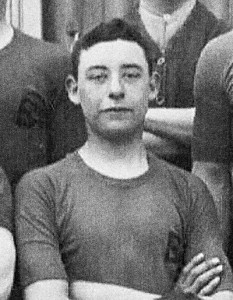My great great uncle, Alexander Frank Crawshaw, was born in Brixton in 1893 and died 21 years later on 11th February 1915 amid the mud and carnage of The Western Front. Using transcripts from his letters, photographs and other sources, I hope to uncover more about Frank, or “Biddy” as he was known to his family, and explore the world he lived in.
A collection of 32 letters was transcribed by my great uncle, Geoff Debnam in 1998. I have a copy of that transcription, while the originals remain in his ownership in Wellington, New Zealand. I am entirely to blame for any poor typing or factual errors. Spelling and punctuation remains as it is in the transcripts. I have referenced in Geoff’s notes where I think it helps.
His son, Carl, kindly scanned in the incredible photos of Frank and his comrades. I will tell the story of how the letters came to be found at a later date, but I think that it is fair to say that these were kept private by Mable, my Great Grandmother on my mother’s side. She, like countless other sisters, mothers, girlfriends and wives around Britain, was deeply affected by Frank’s death and never really came to terms with it. Most of the surviving letters were sent to her, but there are a couple to his Aunt Webster as well.
I will certainly make lots of factual errors along the way but hope that people reading this blog (if I am lucky enough) will be able to correct and educate me with their own knowledge of the period. I want to encourage your comments and welcome any correspondence. I hope you enjoy what you find, and I hope this inspires you to delve into your family’s past. You never know what secrets you might find…
Frank joins the Army
The first letter finds Frank living at Blackdown in September 1912. Blackdown camp was a large army camp near Aldershot in Hampshire. It is now part of the infamous Deepcut barracks. The Dorsetshire Regiment was based there from 1911 through to 1913, until it was posted to Victoria Barracks in Belfast.
The Dorsetshire Regiment (or the Dorsets as it was more commonly known) was formed in 1881 by the amalgamation of the 39th (Dorsetshire) Regiment of Foot and the 54th (West Norfolk) Regiment of Foot.
Most regiments in the British Army, at the beginning of the war in 1914, had 2 battalions; each of which generally contained 1,007 men (although once a regiment was engaged in the field it rarely achieved its full complement). There were usually four companies to a battalion. Each company of 227 men was further split into four platoons and then into sections of 12 men and a Non-Commissioned Officer (NCO). Other parts of a 1914 battalion included the Battalion HQ, machine gun section and transport. Frank belonged to E company (Coy) in the 1st Battalion (Bn) of the Dorsetshire Regiment.
By the time we meet Frank, in a letter to his sister Mabel in September 1912, he had been in the Army for 18 months. He joined the Dorsets after passing a medical in Dorchester on the 11th February 1911 and was enlisted a few days later on the 16th of February.
Frank had been promoted to Lance Corporal on 28th January 1912. A Lance Corporal was the first step up the ladder from the rank of Private. It was an unofficial position; the holder could be demoted at any time by their commanding officer. Essentially they made sure that their small group, or tent, completed tasks assigned to them; thinks like polishing boots and tidying up. They were also usually second-in-charge of a rifle or machine gun group. A Lance Corporal was distinguished by a single chevron stripe worn on the arm. Frank would have been addressed as “Corporal”.
Next week
I am going to look at his first letter to Mable and look at Frank’s background; where he came from, and the various members of his family.

Fascinating website!! Would you be kind enough to make clear the link between your relative and Montagu Dalston Turnbull?
Thanks for the comment and sorry my reply is so late coming! There is no connection between the two people other than they both came under the 15th Brigade. I thought it was an interesting story. Do you have any information about this chap?